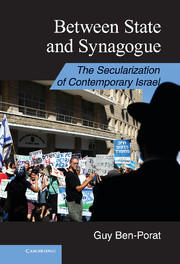2 - Israel
From Status Quo to Crisis
Published online by Cambridge University Press: 05 January 2013
Summary
Religion continues to play an important and disputed role in both private and public life in Israel. The debate over the status of halakhah (Jewish religious law) in the conduct of public and private life has occupied the largely secular Zionist movement from its very beginnings. The secular–religious debate became more concrete and acute first, once the pre-state entity became a sovereign state faced with essential questions relating to daily life and the nature of the public domain and, second, when the institutions established in early statehood to resolve the dilemmas could no longer provide solutions in the face of a changed reality. Secularization in this work, as elaborated in the previous chapter, refers to a decline in religious authority and a process in which religion loses its hold over public life. In Israel, it refers specifically to the erosion of the status quo as an institutional arrangement and, specifically, to the erosion of the authority of the Orthodox rabbinical establishment over daily life. When we turn to examining the forces behind secularization, this definition incorporates different secularizing projects carried out by entrepreneurs with different ideologies, objectives, and strategies.
The late writer and journalist Israel Segal, a secularist who left the ultra-Orthodox world years ago, provided a pessimistic account of a secular defeat in a culture war: “In my view, the full-scale war has already ended in defeat for the secular people.…[W]e are living under a regime of occupation imposed by a haredi (ultra-Orthodox) minority and this occupation is growing more intensive” (Segal, 1999: 140). An assessment of the reality of religious power more than a decade later, suggests a more complex picture, where, alongside religion, secularization can be identified in private and public life. This secularization, following the framework developed in the previous chapter, is measured in the decline of religious authority rather than by individual levels of religious belief and practices, is underpinned by both ideological and nonideological forces, does not diminish the presence of religion in public life, and, consequently, its impact is significant but restricted.
- Type
- Chapter
- Information
- Between State and SynagogueThe Secularization of Contemporary Israel, pp. 27 - 59Publisher: Cambridge University PressPrint publication year: 2013



